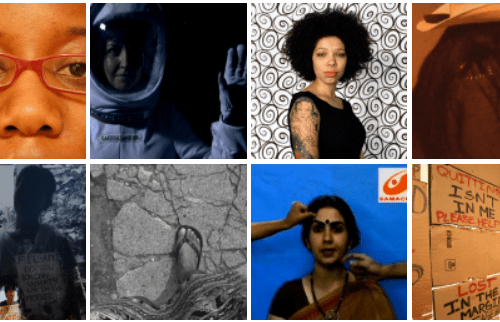Article notes 1
To imagine how sexual justice might relate to economic justice, the empirical materialist in me asks: how, and where, do they meet already? The actually existing projects I turn to in response are the global movements associated with economic justice, specifically the alter- or anti-globalization movements associated with the World Social Forum (WSF). Examining the geopolitical contexts, texts, and practices of the Forum, I explore how projects for sexual and economic justice have, or have failed to, interact in that self-consciously alternative space.
My emphasis on this particular site emerges from reflections on modes of interpreting transnational feminist and queer politics. One common mode evaluates the intersection of economic and sexual justice projects according to received scales of political judgement, for example, scales of political success, radicalism, or inclusion. Another mode analyzes projects respective conceptual logics, often according to similar scales. This essay opts for a different mode, which might be considered empirical and materialist. It brings an analytical geographic lens to explore claims for justice made through particular forms and spaces at a particular historical juncture. Such a theoretically-inflected but empirical description of actually existing politics explores analytical questions about the affiliation of Marxism with queer and feminist theories through materialist investigations of history, location, relation, and practice.
Actually Existing Limits
In the post-Cold-War period, characterized by the diminished power of an international socialist idiom, 2 the most vibrant calls for transnational economic justice have been the disparate political projects that loosely cohered under the labels “global justice” or “anti/alter-globalization.” 3 Many of these projects come together at the World Social Forum, a gathering of thousands that has met in Brazil, India, Kenya, and at smaller regional forums for nearly a decade. 4
The WSF (or in its original host language, Portuguese, the Fórum Social Mundial), began in 2001 as a protest against capitalist globalization (specifically against the powerful and private World Economic Forum held in Davos at the same time). In subsequent years, it evolved into a wide umbrella for radical politics, incorporating expanded representations of sexuality in its programming. Advocates for women’s sexual rights and for the rights of lesbians, gays, bisexuals and transgenders—LGBT or queers—have found sympathetic ground at the Forums held in Brazil and India and many of the regional Forums, although not all of them. This essay discusses the WSF editions from 2001 to 2007 as a real-world sites where the political projects of sexual and economic justice co-exist and, potentially, comingle.
Although WSF politics have a somewhat identifiable core centered on struggles against global capitalism and imperialism, there is contestation over how that political center articulates with other issues, such as national struggles, orthodox religions, or non-governmental organizations—or gender or sexuality. Many have argued that the alter-globalization movement’s reception of feminist contributions remains uneven, incomplete, or under-thought. 5 And if the WSF’s engagement with feminism remains underdeveloped, the articulation of sexual politics is even less clear. According to Johanna Brenner, the Forum exhibits “strategic silences” about abortion and sexual orientation, in large part because of it welcomes the anti-imperialist projects of religious organizations that are otherwise conservative on gender and sexual politics. 6 The limited integration of sexual politics into the prevailing political discourse of the World Social Forum conjures up long-standing suspicions that the left’s view of the salience of sexual politics remains dim. 7
The starting point for this essay is this observation: that progressive sexual and economic politics come together unevenly and incompletely at the Forum. A simple reason for this is the fact that advocacy for sexual politics and economic justice, as expressed at the WSF, have autonomous genealogies and orientations. In the approach taken here, I do not adjudicate, but rather describe the uneven convergence between the two projects as they are appear in three domains: the geopolitical context for the two fields; global-justice discourse about sexuality (represented by WSF texts); and sexual-rights engagements in the space of the World Social Forum.
- This paper emerged through discussion at a Colloquium, Toward a Vision of Sexual and Economic Justice, held at the Barnard Center for Research on Women and an invited lecture for the Department of Anthropology at Northwestern University. I thank Micaela di Leonardo, Janet Jakobsen, and Kate Bedford for providing those engaging exchanges and Yukiko Hanawa for eleventh-hour conversations on emergent politics.[↑]
- International socialism lacked force in the political landscape at least from the 1990s into the 2000s. In more recent years, elections in Latin America resulted in forms of neo-socialist governmental and regional politics, but established socialist vocabulary still has not provided the dominant idioms for major strands of transnational advocacy in the post-Cold-War period.[↑]
- These movements crystallized in a series of protests first identified with the dramatic 1990 demonstrations against the World Trade Organization (WTO) in Seattle. However, feminists, environmentalists, and labor had criticized the World Bank or WTO before the protests at Seattle in 1999.[↑]
- For information about the Forum, see “Charter of Principles,” World Social Forum,
www.forumsocialmundial.org.br/main.php?id_menu=4&cd_language=2 (accessed June 16, 2009); “Manifesto of Porto Alegre (unofficial translation),” World Social Forum, la.indymedia.org/news/2005/03/123579.php (accessed March 10, 2005); and Peter Waterman, “Place, Space and the Reinvention of Social Emancipation on a Global Scale,” April 4, 2003, LabourNet Germany, www.labournet.de/diskussion/wipo/seattle/pa03/waterman.html (accessed June 16, 2009).[↑] - On the relation of alter-globalization movements to feminism, see Catherine Eschle, “‘Skeleton Women’: Feminism and the Antiglobalization Movement,” Signs 30.3 (2005): 1741-70. On the World Social Forum and feminism, see the special issue of the Journal of International Women’s Studies 8(3) April 2007, www.bridgew.edu/SoAS/jiws/April07/index.htm; and Sonia E. Alvarez with Nalu Faria and Miriam Nobre, “Another (Also Feminist) World Is Possible: Constructing Transnational Spaces and Global Alternatives from the Movements,” Trans. Arturo Escobar, The World Social Forum: Challenging Empires, Jai Sen, Anita Anand, Arturo Escobar, and Peter Waterman, eds, (New Delhi: Viveka Foundation, 2004). Online version published by Choike.org, www.choike.org/documentos/wsf_s313_alvarez.pdf (accessed October 20, 2006).[↑]
- Johanna Brenner, “Transnational Feminism & the Struggle for Global Justice,” New Politics 9.2 (2003): 78-87 and excerpted in The World Social Forum, Sen, Anand, Escobar, and Waterman, eds, 32-33. Online version published by Choike.org, www.choike.org/documentos/wsf_s106_brenner.pdf (accessed April 9, 2005).[↑]
- Lisa Duggan, The Twilight of Equality? Neoliberalism, Cultural Politics and the Attack on Democracy (Boston: Beacon Press, 2003).[↑]



